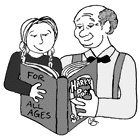|
Don’t
judge a book by its cover As I was walking out of Subway last week, a familiar picture and catchy headline on the front page of the Fort Worth Star-Telegram made me stop in my tracks. It was not another story on Bush’s tax-cut proposal, nor was it the picture of angry University of North Texas students that made my feet stop and my face light up with joy. It was Harry
Potter, the main character in J.K. Rowling’s best-selling books,
who captured my attention in the middle of that sidewalk on Berry
Street. “Hit or Myth,” read the headline above Chris Vaugn’s article about including “Harry Potter and the Sorcerer’s Stone” in the University Interscholastic League’s 2001 reading selection for high-school literary criticism contests. So what would make UIL decide to include this best-selling book in a list next to classics such as John Steinbeck’s “The Grapes of Wrath,” Ernest Hemingway’s “A Farewell to Arms” and William Shakespeare’s “Othello?” Pure genius. If somebody was to write down and research every mythical allusion and deep-hidden symbol and archetype from “The Sorcerer’s Stone,” he or she would probably have at least a year’s worth of work. If somebody was to write a high-school or college-level essay topic about anything in this imaginative story, he or she would have just as much difficulty writing it as if they were working with Gustave Flaubert’s “Madame Bovary.” The fact is, people are just confused that there is a book that surpasses the age gap by being attractive to everybody from second grade to retirement age. But that characteristic of the Harry Potter series is its most charming. One of the most annoying questions I get from people when I tell them I am in love with this captivating collection is, “Why are you reading a children’s book?” My reply: “Who told you it was made for children?” Rowling says she did not and does not write these extraordinary stories with any particular audience in mind. And if those critics, who claim it is ridiculous for a college student to read a “children’s level” book, disagree with UIL’s decision, I say they have not taken the time to read between Rowling’s lines (if they have read the lines at all, that is). My favorite quote in the article was from Fred Tarpley, the contest director and a professor at Texas A&M-Commerce. “I thought, ‘Harry Potter is getting a lot of attention, it has the potential to be a classic, so for once, why don’t we choose something not written by a dead person?’” Tarpley said. Goodness, open-minded people sure make a difference in the world, don’t they? We know the Harry Potter books won’t instantly become difficult high-school-reading-level classics, but that does not mean they can’t be analyzed and appreciated as much as J.D. Salinger’s “The Catcher in the Rye.” Take the time to judge something by its content — not its tendency to sell out within hours to second-and third-grade students. And if you don’t want to read the books, then don’t. Just don’t criticize what is unfamiliar to you When Rowling finally releases the fifth book of her seven-book series sometime this year, I don’t think parents will be reluctant to take their children to the bookstore. And I don’t think UIL will be reluctant to look at the new book for consideration on the 2002 literary criticism selection list. So instead of complaining that Rowling will be next to Rudolfo Anaya and Flannery O’Connor on tests this year, we should be celebrating the fact that children and adults alike will have even more pride when they open up a copy of “Harry Potter and the Sorcerer’s Stone.” Emily
Ward is a junior math and news-editorial major from Springtown.
Editorial policy: The content of the Opinion page does not necessarily represent the views of Texas Christian University. Unsigned editorials represent the view of the TCU Daily Skiff editorial board. Signed letters, columns and cartoons represent the opinion of the writers and do not necessarily reflect the opinion of the editorial board. Letters to the editor: The Skiff welcomes letters to the editor for publication. Letters must be typed, double-spaced, signed and limited to 250 words. To submit a letter, bring it to the Skiff, Moudy 291S; mail it to TCU Box 298050; e-mail it to skiffletters@tcu.edu or fax it to 257-7133. Letters must include the author’s classification, major and phone number. The Skiff reserves the right to edit or reject letters for style, taste and size restrictions. |
The TCU Daily Skiff © 1998, 1999, 2000, 2001
Web Editor: Ben Smithson
Contact Us!

